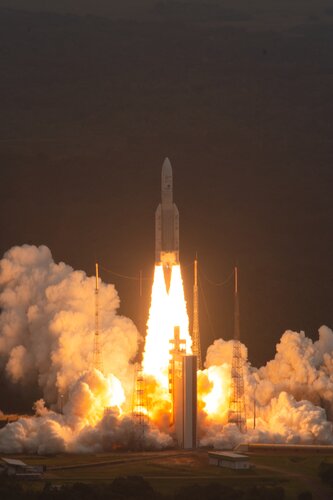
Copernical Team
China launches Tianhui 4 satellite into orbit
 China launched the Tianhui 4 satellite into space on Wednesday evening from the Jiuquan Satellite Launch Center in northwestern China's Gobi Desert, according to China Aerospace Science and Technology Corp.
The State-owned space contractor said the satellite was deployed by a Long March 2D carrier rocket that blasted off at 7:13 pm and has entered orbit.
Tianhui 4, built by the compa
China launched the Tianhui 4 satellite into space on Wednesday evening from the Jiuquan Satellite Launch Center in northwestern China's Gobi Desert, according to China Aerospace Science and Technology Corp.
The State-owned space contractor said the satellite was deployed by a Long March 2D carrier rocket that blasted off at 7:13 pm and has entered orbit.
Tianhui 4, built by the compa Satellogic to build high-throughput manufacturing plant in Netherlands
 Satellogic, a leader in sub-meter resolution satellite imagery collection, announced that it will be constructing a high-throughput satellite manufacturing facility in the Netherlands.
This 57,000 square foot new location is expected to accelerate the company's assembly of satellites and accommodate its state-of-the-art manufacturing, integration, and testing equipment. In addition to havi
Satellogic, a leader in sub-meter resolution satellite imagery collection, announced that it will be constructing a high-throughput satellite manufacturing facility in the Netherlands.
This 57,000 square foot new location is expected to accelerate the company's assembly of satellites and accommodate its state-of-the-art manufacturing, integration, and testing equipment. In addition to havi James Webb telescope completes tower extension
 The James Webb Space Telescope continued to deploy perfectly Wednesday as it flew over 360,000 miles from Earth on a million-plus-mile journey to its destination.
The latest maneuver for the $10 billion observatory was to extend its Deployable Tower Assembly, which hoists the giant gold reflective mirror a little further from the thruster and heat shield.
The tower extension occu
The James Webb Space Telescope continued to deploy perfectly Wednesday as it flew over 360,000 miles from Earth on a million-plus-mile journey to its destination.
The latest maneuver for the $10 billion observatory was to extend its Deployable Tower Assembly, which hoists the giant gold reflective mirror a little further from the thruster and heat shield.
The tower extension occu Carbonaceous chondrite impact responsible for lunar water: study
 A Chinese research team has found that a meteorite hit the moon about one million years ago through data sent by the Chang'e-4 probe, according to the Chinese Academy of Sciences (CAS).
The impact event is believed to be related with carbonaceous chondrites, a water-rich class of asteroids, according to Liu Yang with the National Space Science Center (NSSC) under the CAS, corresponding aut
A Chinese research team has found that a meteorite hit the moon about one million years ago through data sent by the Chang'e-4 probe, according to the Chinese Academy of Sciences (CAS).
The impact event is believed to be related with carbonaceous chondrites, a water-rich class of asteroids, according to Liu Yang with the National Space Science Center (NSSC) under the CAS, corresponding aut Virgin Orbit expected to list on NASDAQ
 NextGen Acquisition Corp. II stockholders has approved the previously-announced business combination with Vieco USA, Inc., the parent company of Virgin Orbit ("Virgin Orbit" or the "Company"), at a special meeting of stockholders held. A Form 8-K disclosing the full voting results is expected to be filed with the Securities and Exchange Commission.
Also, NextGen and the Virgin Group announ
NextGen Acquisition Corp. II stockholders has approved the previously-announced business combination with Vieco USA, Inc., the parent company of Virgin Orbit ("Virgin Orbit" or the "Company"), at a special meeting of stockholders held. A Form 8-K disclosing the full voting results is expected to be filed with the Securities and Exchange Commission.
Also, NextGen and the Virgin Group announ Experiments show algae can survive in Mars-like environment
 Chinese researchers have demonstrated that algae can survive in a Mars-like environment during four experiments since 2019, raising the hope that mankind might be able to turn the barren planet into an earth-like green one in the future.
In a seven-hour experiment which took place in September this year, algae were carried by a helium balloon to an altitude of 30,000 meters and survived fo
Chinese researchers have demonstrated that algae can survive in a Mars-like environment during four experiments since 2019, raising the hope that mankind might be able to turn the barren planet into an earth-like green one in the future.
In a seven-hour experiment which took place in September this year, algae were carried by a helium balloon to an altitude of 30,000 meters and survived fo 2021: A year of space tourism, flights on Mars, China's rise
 From the Mars Ingenuity helicopter's first powered flight on another world to the launch of the James Webb telescope that will peer into the earliest epoch of the Universe, 2021 was a huge year for humanity's space endeavors.
Beyond the science milestones, billionaires battled to reach the final frontier first, an all-civilian crew went into orbit, and Star Trek's William Shatner waxed profo
From the Mars Ingenuity helicopter's first powered flight on another world to the launch of the James Webb telescope that will peer into the earliest epoch of the Universe, 2021 was a huge year for humanity's space endeavors.
Beyond the science milestones, billionaires battled to reach the final frontier first, an all-civilian crew went into orbit, and Star Trek's William Shatner waxed profo Musk says his 'tiny' satellites can't block any rival spacecraft
 The accusations come amid the Chinese complaint filed in the UN in December, describing how in October and July, two Starlink satellites caused the Chinese space station to adopt "preventive collision avoidance control" procedures to "ensure the safety and lives of in-orbit astronauts".
Elon Musk has responded to multiple claims that his company's Starlink satellites take up too much space
The accusations come amid the Chinese complaint filed in the UN in December, describing how in October and July, two Starlink satellites caused the Chinese space station to adopt "preventive collision avoidance control" procedures to "ensure the safety and lives of in-orbit astronauts".
Elon Musk has responded to multiple claims that his company's Starlink satellites take up too much space Precise Ariane 5 launch likely to extend Webb's expected lifetime

After a successful launch of the NASA/ESA/CSA James Webb Space Telescope on 25 December, and completion of two mid-course correction manoeuvres, the Webb team has analysed its initial trajectory and determined the observatory should have enough propellant to allow support of science operations in orbit for significantly more than a 10-year lifetime (the minimum baseline for the mission is five years).
With its single 'eye,' NASA's DART returns first images from space

Just two weeks after launching from Vandenberg Space Force Base in California, NASA's Double Asteroid Redirection Test (DART) spacecraft has opened its "eye" and returned its first images from space—a major operational milestone for the spacecraft and DART team.
After the violent vibrations of launch and the extreme temperature shift to minus 80 degrees C in space, scientists and engineers at the mission operations center at the Johns Hopkins Applied Physics Laboratory in Laurel, Maryland, held their breath in anticipation. Because components of the spacecraft's telescopic instrument are sensitive to movements as small as 5 millionths of a meter, even a tiny shift of something in the instrument could be very serious.

